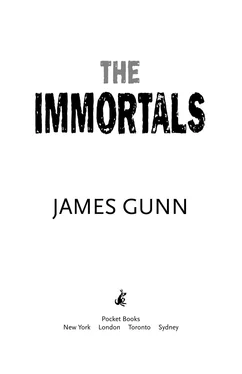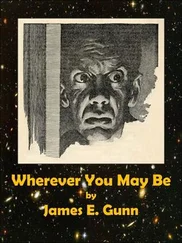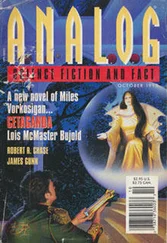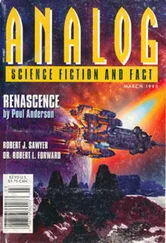She started to move. “Sit still!” he whispered. “We’ve got to wait until they give up the search.”
At least he had eliminated the greatest danger: Eyes with his radar, X-ray, maybe infrared vision that was just as good by night as by day.
They sat in the darkness and waited, listened to the forest noises. An hour passed. Harry was going to say that perhaps it was safe to move, when he heard something rustling nearby. Animal, or human enemy? Marna, who had not touched him again or spoken, clutched his upper arm with a panic-strengthened hand. Harry doubled his fist and drew back his arm.
“Doctor Elliott?” Christopher whispered. “Marna?”
Relief surged over Harry like a warm, life-giving current. “You wonderful little imp! How did you find us?”
“Grampa helped me. He has a sense for that. I have a little, but he’s better. Come.”
Harry felt a small hand fit itself into his.
Christopher led them through the darkness. At first Harry was distrustful, and then, as the boy kept them out of bushes and trees, he moved more confidently. The hand became something he could trust. He knew how Pearce felt, and how bereft he must be now.
Christopher led them a long way before they reached another clearing. A bed of coals glowed dimly beneath a bower built from bent green branches and stuffed with leaves. Pearce sat near the fire, slowly turning a spit fashioned from another branch. It rested on two forked sticks. On the spit two skinned rabbits were golden brown and sizzling.
Pearce’s sightless face turned as they entered the clearing. “Welcome back,” he said.
Harry felt a warmth inside him that was like coming home. “Thanks,” he said. His voice was husky.
Marna fell to her knees in front of the fire, raising her hands to it to warm them. Rope dangled from them, frayed in the center where she had methodically picked it apart while she had waited by another fire. She must have been cold, Harry thought, and I let her shiver through the forest while I was warm in my jacket. But it was too late to say anything.
When Christopher removed the rabbits from the spit, they almost fell apart. He wrapped four legs in damp green leaves and tucked them away in a cool hollow between two tree roots. “That’s for breakfast,” he said.
The four of them fell upon the remainder. Even without salt, it was the most delicious meal Harry had ever eaten. When it was finished, he licked his fingers, sighed, and leaned back on a pile of old leaves. He felt more contented than he could remember being since he was a child. He was a little thirsty, because he had refused to drink from the brook that ran through the woods close to their improvised camp, but he could stand that. A man couldn’t surrender all his principles. It would be ironic to die of typhoid so close to his chance at immortality. That the governor would confer immortality upon him—or at least put him into a position where he could earn it—he did not doubt. After all, he had saved the governor’s daughter. Marna was a pretty little thing. It was too bad she was still a child. An alliance with the governor’s family would not hurt his chances. Perhaps in a few years—He pushed the notion away. Marna hated him.
Christopher shoveled dirt over the fire with a large piece of bark. Harry sighed again and stretched luxuriously. Sleeping would be good tonight.
Marna had washed at the brook. Her face was clean and shining. “Will you sleep here beside me?” Harry asked her, touching the dry leaves. He held up his bracelet apologetically. “This thing keeps me awake when you’re very far away.”
She nodded coldly and sat down nearby—but far enough so that they did not touch. Harry said, “I can’t understand why we’ve run across so many teratisms. I can’t remember ever seeing one in my practice at the Medical Center.”
“You were in the clinics?” Pearce asked. And without waiting for an answer he went on, “Increasingly, the practice of medicine becomes the treatment of defectives, genetic monstrosities. In the city they would die; in the suburbs they are preserved to perpetuate themselves. Let me look at your arm.”
Harry started. Pearce had said it so naturally that for a moment he had forgotten that the old man couldn’t see. The old man’s gentle fingers untied the bandage and carefully pulled the matted grass away. “You won’t need this anymore.”
Harry put his hand wonderingly to the wound. It had not hurt for hours. Now it was only a scar. “Perhaps you really were a doctor. Why did you give up practice?”
Pearce whispered, “I grew tired of being a technician. Medicine had become so desperately complicated that the relationship between doctor and patient was not much different from that between mechanic and equipment.”
Harry objected. “A doctor has to preserve his distance. If he keeps caring, he won’t survive. He must become callous to suffering, inured to sorrow, or he couldn’t continue in a calling so intimately associated with them.”
“No one ever said,” Pearce whispered, “that it was an easy thing to be a doctor. If he stops caring, he loses not only his patient but his own humanity. But the complication of medicine had another effect. It restricted treatment to those who could afford it. Fewer and fewer people grew healthier and healthier. Weren’t the rest human, too?”
Harry frowned. “Certainly. But it was the wealthy contributors and the foundations that made it all possible. They had to be treated first so that medical research could continue.”
Pearce whispered, “And so society was warped all out of shape; everything was sacrificed to the god of medicine—all so that a few people could live a few years longer. Who paid the bill?
“And the odd outcome was that those who received care grew less healthy, as a class, than those who had to survive without it. Premies were saved to reproduce their weaknesses. Faults that would have proved fatal in childhood were repaired so that the patient reached maturity. Nonsurvival traits were passed along. Physiological inadequates multiplied, requiring greater care—”
Harry sat upright. “What kind of medical ethics are those? Medicine can’t count the cost or weigh the value. Its business is to treat the sick—”
“Those who can afford it. If medicine doesn’t make decisions about the rationing of care, then something else will: power or money or groups. One day I walked out on all that. I went among the citizens, where the future was, where I could help without discrimination. They took me in; they fed me when I was hungry, laughed with me when I was happy, cried with me when I was sad. They cared, and I helped them as I could.”
“How?” Harry asked. “Without a diagnostic machine, without drugs or antibiotics.”
“The human mind,” Pearce whispered, “is still the best diagnostic machine. And the best antibiotic. I touched them. I helped them to cure themselves. So I became a healer instead of a technician. Our bodies want to heal themselves, you know, but our minds give counter-orders and death instructions.”
“Witch doctor!” Harry said scornfully.
“Yes. Always there have been witch doctors. Healers. Only in my day have the healer and the doctor become two persons. In every other era the people with the healing touch were the doctors. They existed then; they exist now. Countless cures are testimony. Only today do we call it superstition. And yet we know that some doctors, no wiser or more expert than others, have patients with a far greater recovery rate. Some nurses—not always the best-looking ones—inspire in their patients a desire to get well.
“It takes you two hours to do a thorough examination; I can do it in two seconds. It may take you months or years to complete a treatment; I’ve never taken longer than five minutes.”
Читать дальше












